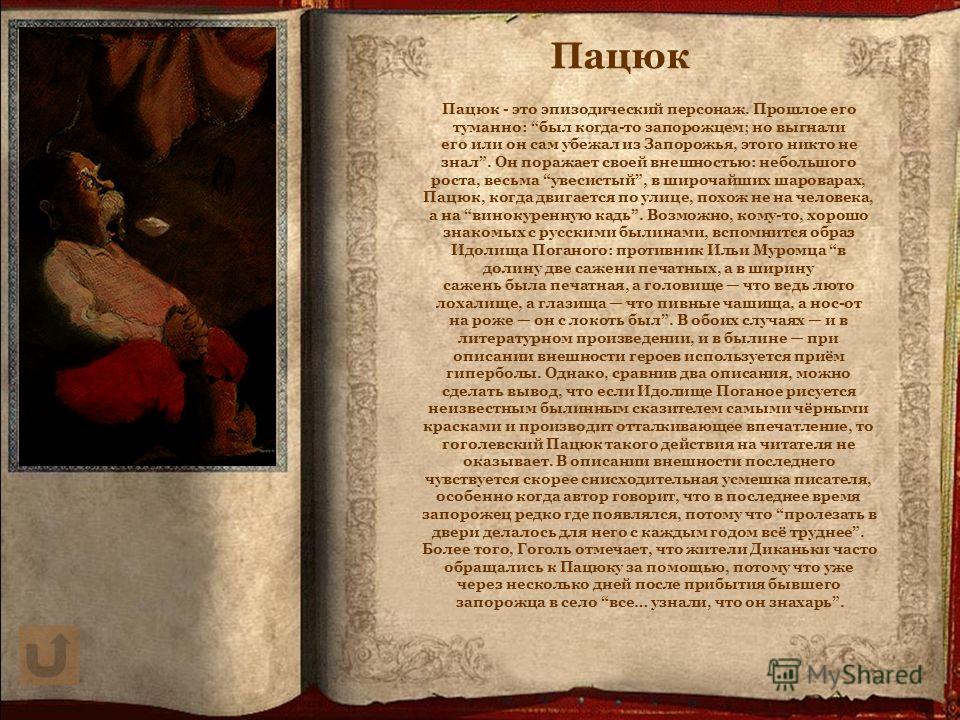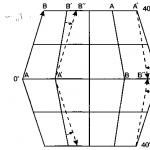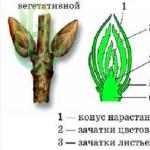Gogol Nikolai Vasilyevich (gg.) Born in the town of Velikie Sorochintsy, Mirgorodsky district, Poltava province, in the family of a landowner. Gogol spent his childhood on the estate of his parents Vasilievka. The cultural center of the region was Kibintsy, the estate of D. P. Troshchinsky, their distant relative, Gogol's father acted as his secretary. In Kibintsy there was a large library, there was a home theater for which Gogol's father wrote comedies, being also his actor and conductor.
In May 1821 he entered the gymnasium of higher sciences in Nizhyn. Here he is engaged in painting, participates in performances. He also tries himself in various literary genres (writes elegiac poems, tragedies, a historical poem, a story). At the same time, he wrote the satire “Something about Nizhyn, or the law is not written for fools” (not preserved). However, he dreams of a legal career. After graduating from the gymnasium in 1828, Gogol in December, together with another graduate A.S. Danilevsky travels to St. Petersburg, where he makes his first literary tests: at the beginning of 1829, the poem "Italy" appears, prints "Hanz Kühelgarten" (under the pseudonym "V. Alov").
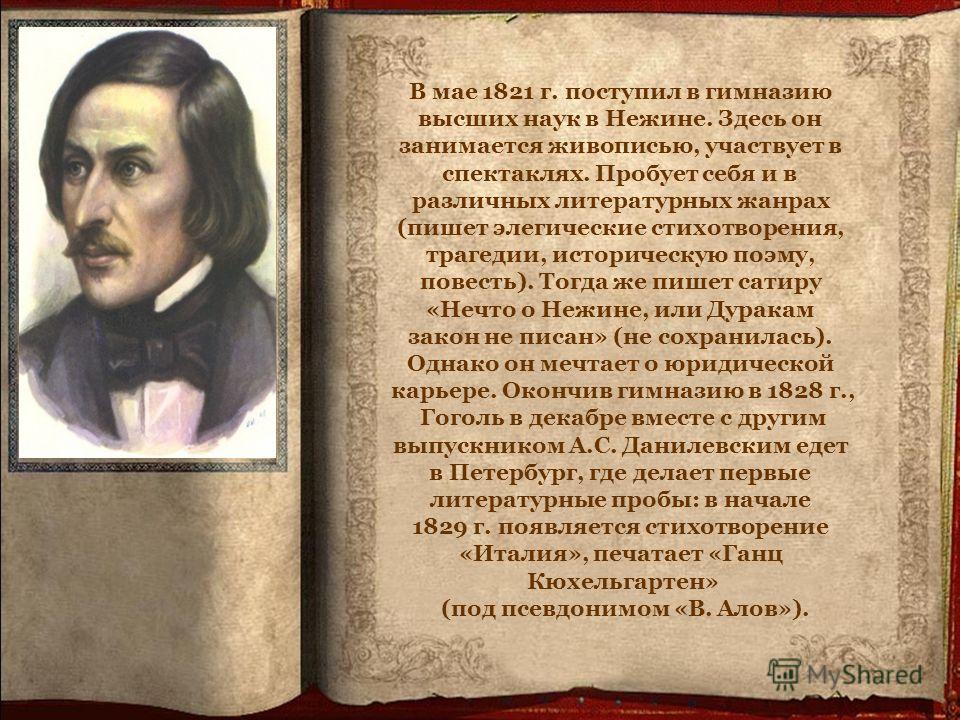
At the end of 1829, he managed to find a job in the Department of State Economy and Public Buildings of the Ministry of the Interior. During this period, “Evenings on a Farm near Dikanka”, “The Nose”, “Taras Bulba” are published. In the autumn of 1835, he set about writing The Inspector General, the plot of which was prompted by Pushkin; the work progressed so successfully that the premiere of the play took place in the spring of 1836 on the stage of the Alexandria Theatre. In June 1836, Gogol left St. Petersburg for Germany (in total, he lived abroad for about 12 years). He spends the end of summer and autumn in Switzerland, where he takes up the continuation of Dead Souls. The plot was also prompted by Pushkin.
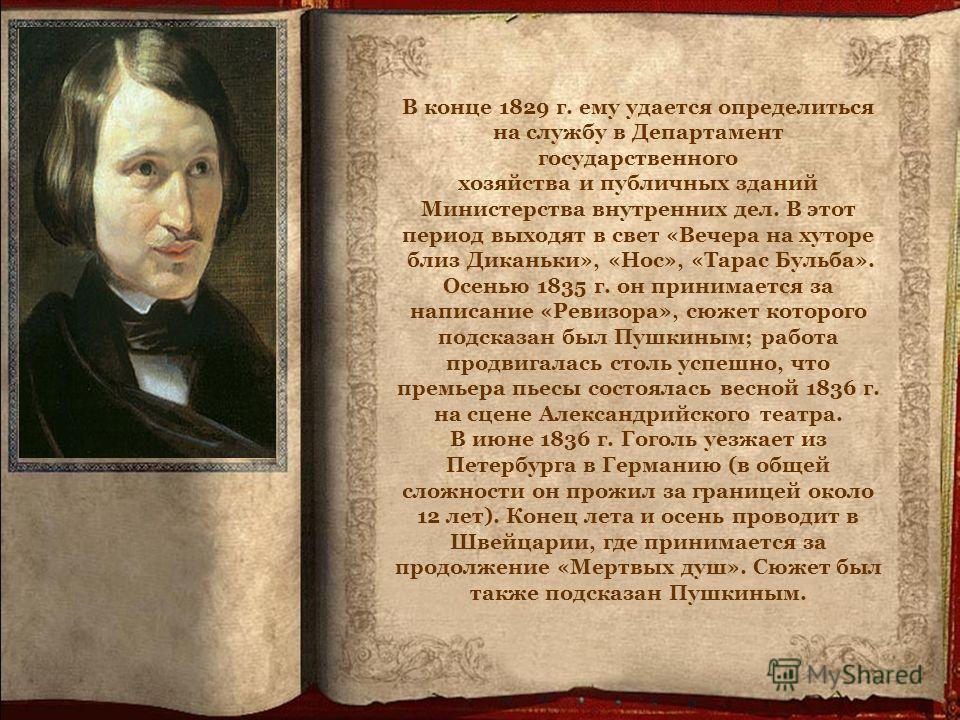
In November 1836, Gogol met A. Mickiewicz in Paris. In Rome, he receives shocking news of the death of Pushkin. In May 1842, "The Adventures of Chichikov, or Dead Souls" was published. Three years (gg.), Following after the departure of the writer abroad, a period of intense and difficult work on the second volume of "Dead Souls". At the beginning of 1845, Gogol showed signs of a mental crisis, and in a state of sharp exacerbation of his illness, he burned the manuscript of the second volume, on which he would continue working after some time.
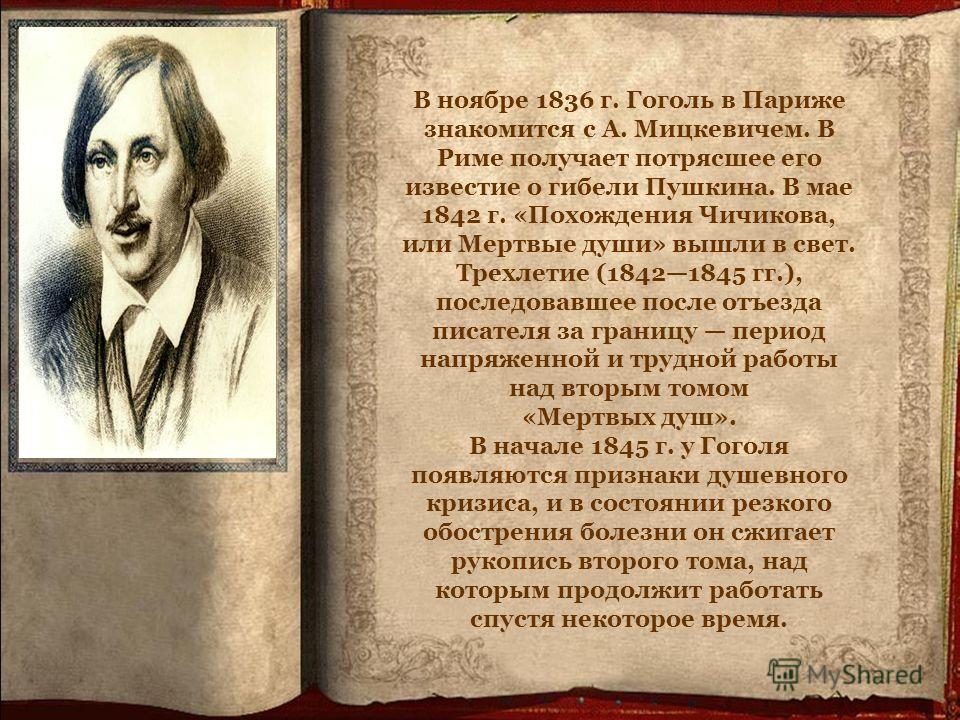
In April 1848, after a pilgrimage to the Holy Land, Gogol finally returns to Russia, where he spends most of his time in Moscow, visits St. Petersburg, and also in his native places in Little Russia. In the spring of 1850, Gogol makes the first and last attempt to arrange his family life and proposes to A.M. Vielgorskaya, but is refused. On January 1, 1852, Gogol informs Arnoldi that the second volume is "completely finished." But in the last days of the month, signs of a new crisis appeared, the impetus for which was the death of E. M. Khomyakova, the sister of N. M. Yazykov, a person spiritually close to Gogol.
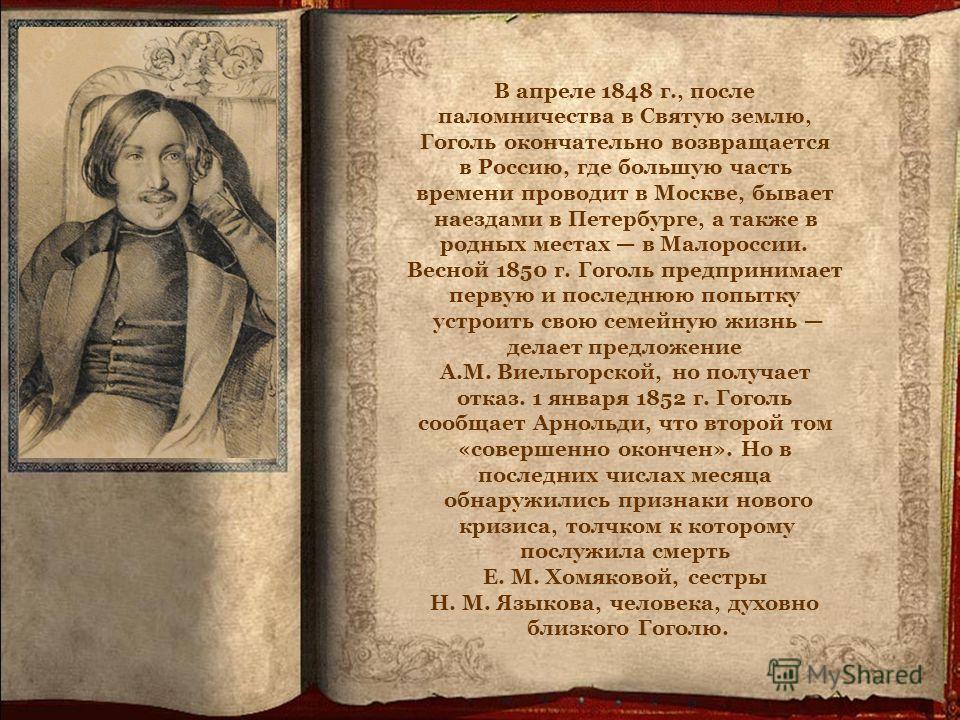
On February 7, Gogol confesses and takes communion, and on the night of February 11-12, he burns the white manuscript of the second volume (only five chapters have been preserved in incomplete form). On the morning of February 21, Gogol died in his last apartment in Talyzin's house in Moscow. The funeral of the writer took place with a huge gathering of people at the cemetery of the St. Danilov Monastery, and in 1931 Gogol's remains were reburied at the Novodevichy cemetery.
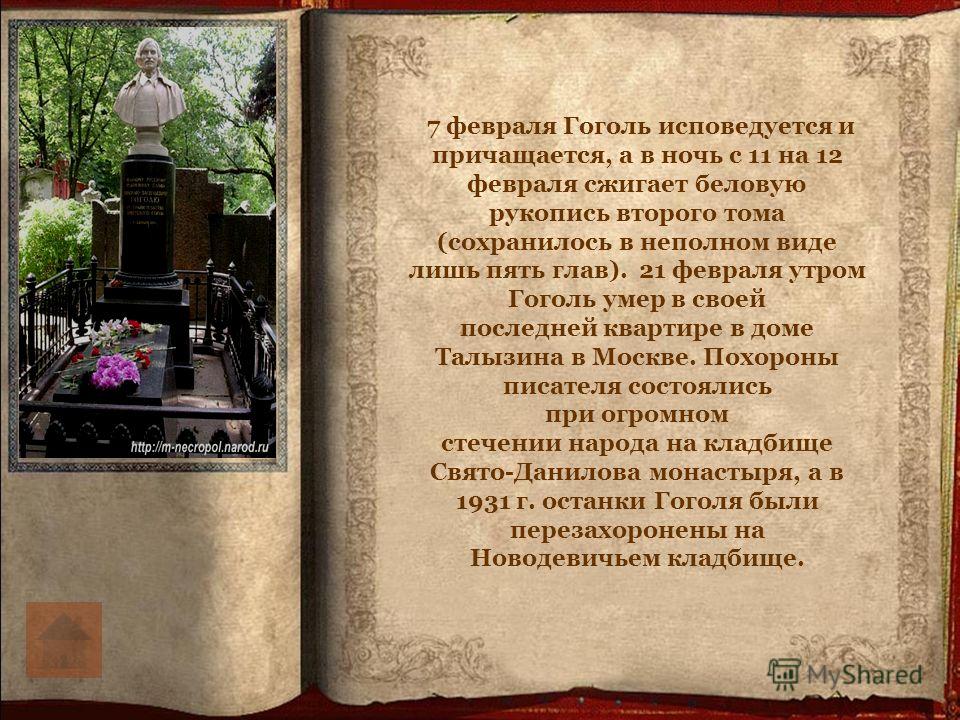
History The time of writing "The Night Before Christmas" is defined differently by different researchers, although within the general framework of the period from 1830 to the winter. The story was first published in the publication: Evenings on a farm near Dikanka. Stories published by Pasichnyk Rudy Pank. Second book. St. Petersburg. Printed in the printing house of A. Plushard (censorship permission January 31, 1832).
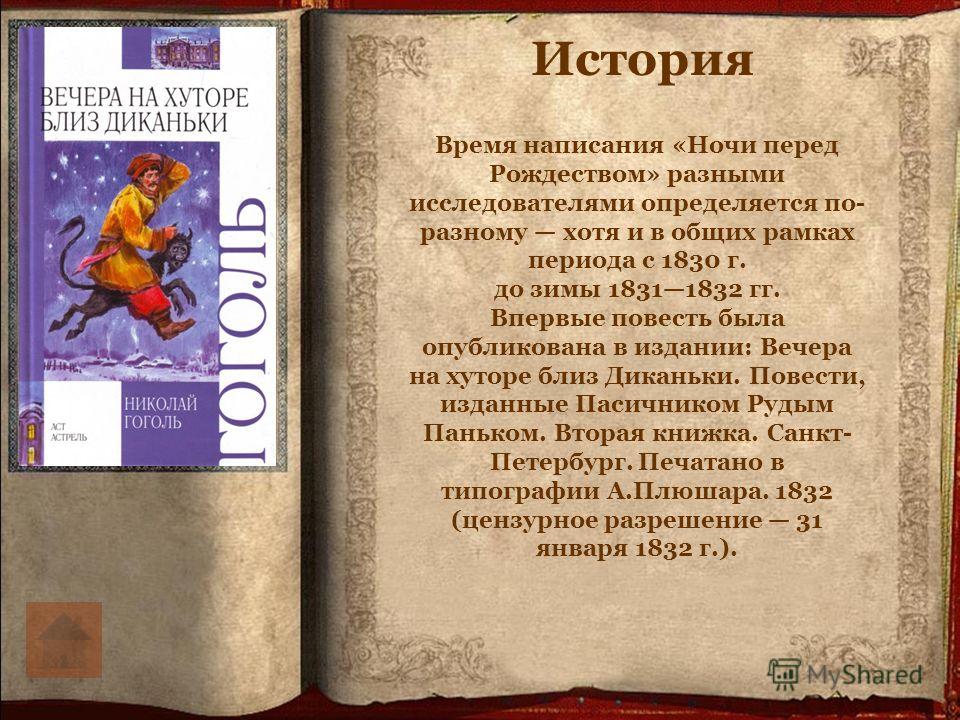
Plot The action of the story is chronologically timed to coincide with an episode of the reign of Catherine II of the last deputation of the Cossacks, which took place in 1775 and was connected with the work of the Commission for the abolition of the Zaporozhian Sich. The plot of the play takes place in Dikanka, Ukraine. Unnoticed by anyone, two are circling in the sky: a witch on a broomstick, who picks up stars in her sleeve, and a devil who hides the month in his pocket, thinking that the darkness that has come will keep the rich Cossack Chub, who was invited to the clerk at kutia, and the hated devil blacksmith Vakula will not dare to come to Chubova's daughter Oksana.
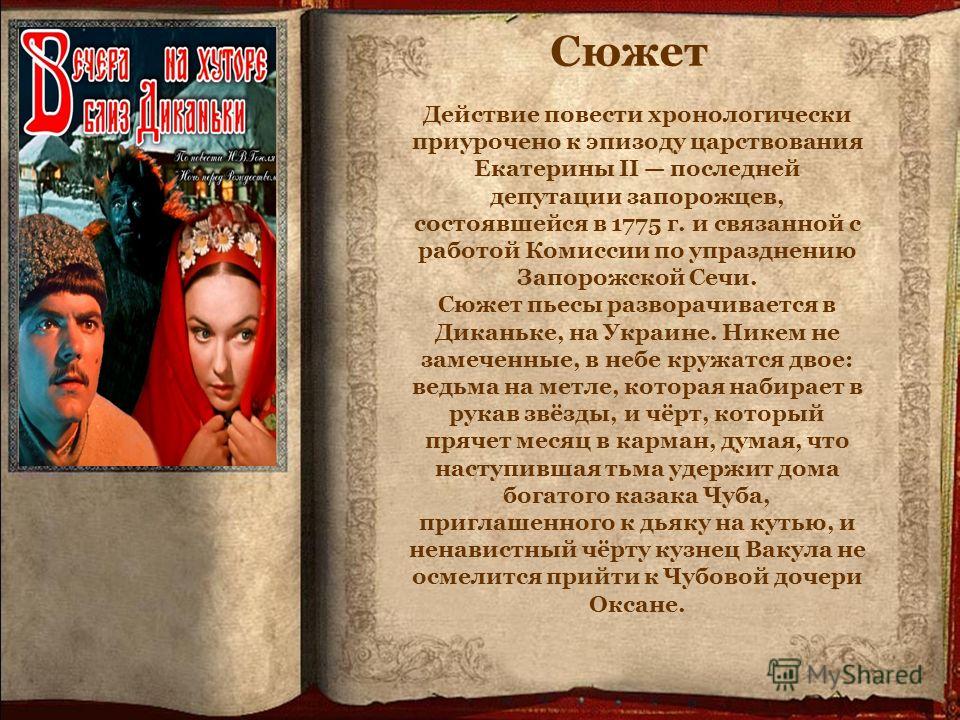
The forelock and the godfather do not know whether to go to the deacon in such darkness, but they decide and leave. The beautiful Oksana remains at home. Vakula arrives. Oksana taunts him. Chub, who has gone astray, knocks on the door, without a godfather, who decided to return home because of the blizzard arranged by the devil. However, having heard the blacksmith, Chub decides that he has fallen into the hut of the lame Levchenko. Chub goes to Vakula's mother, Solokha, who is the very witch who stole the stars from the sky. Oksana is visited by her friends. Oksana notices on one of them laces (shoes) embroidered with gold. Oksana proudly declares that she will marry Vakula if he brings her little slippers, "which the queen wears."
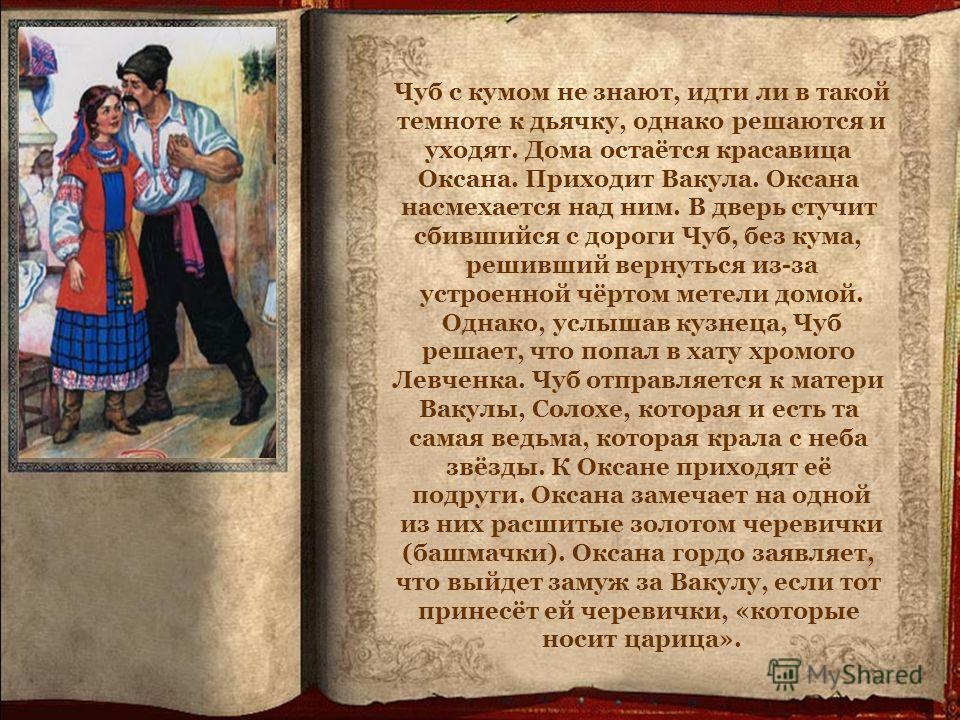
Meanwhile, the devil, who was usefully spending time with Solokha, was frightened by the head, who did not go to the deacon to kutya. The devil climbs into a sack left in the middle of the hut by Vakula, and soon a head crawls into another, because a clerk has come to Solokha. The deacon, who flirted with Solokha, also has to climb to the bag, because Chub comes. However, soon Chub will climb into the same bag, avoiding a meeting with the returned Vakula. While Solokha is talking in the garden with the Cossack Sverbyguz, who came after the blacksmith, Vakula takes away the bags, explaining to himself their severity by his depressed state after meeting Oksana.
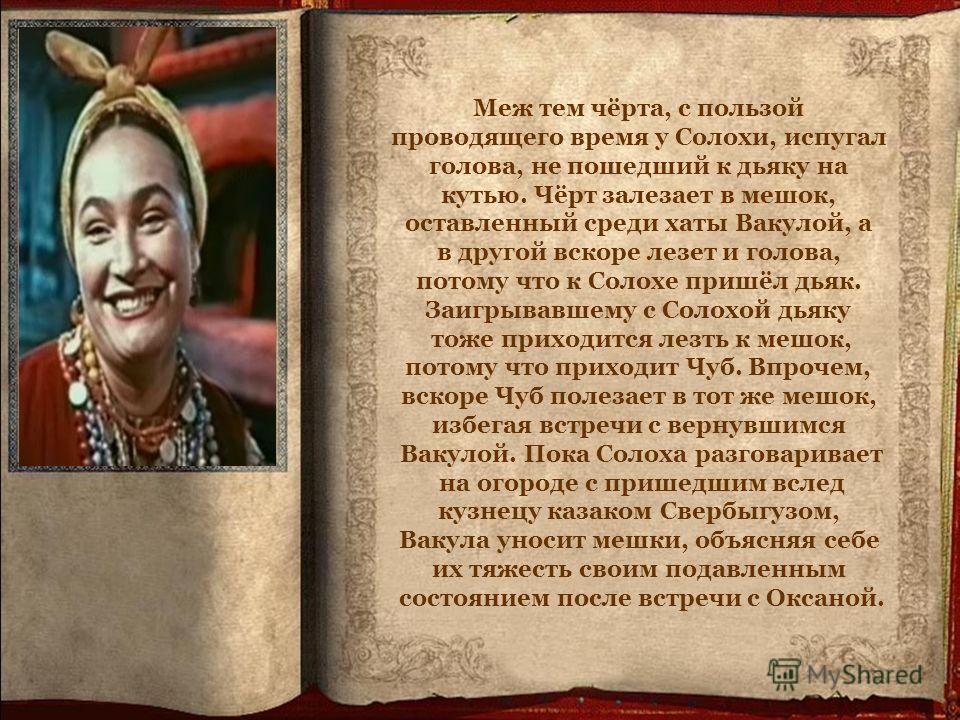
In the crowd of carolers, the blacksmith meets Oksana again, who repeats her promise about the slippers. Out of grief, Vakula decides to drown himself, throws all the bags, except for the smallest one, and runs away. Having calmed down a little, Vakula wants to try another remedy: he comes to the Cossack Pot-bellied Patsyuk, who is “a little like the devil,” and receives a vague answer that the devil is behind him. Anticipating a glorious prey, the devil jumps out of the bag and, sitting on the blacksmith's neck, promises him Oksana that very night. The cunning blacksmith, grabbing the devil by the tail and crossing him, becomes the master of the situation and orders the devil to take himself "to Petemburg, straight to the queen."
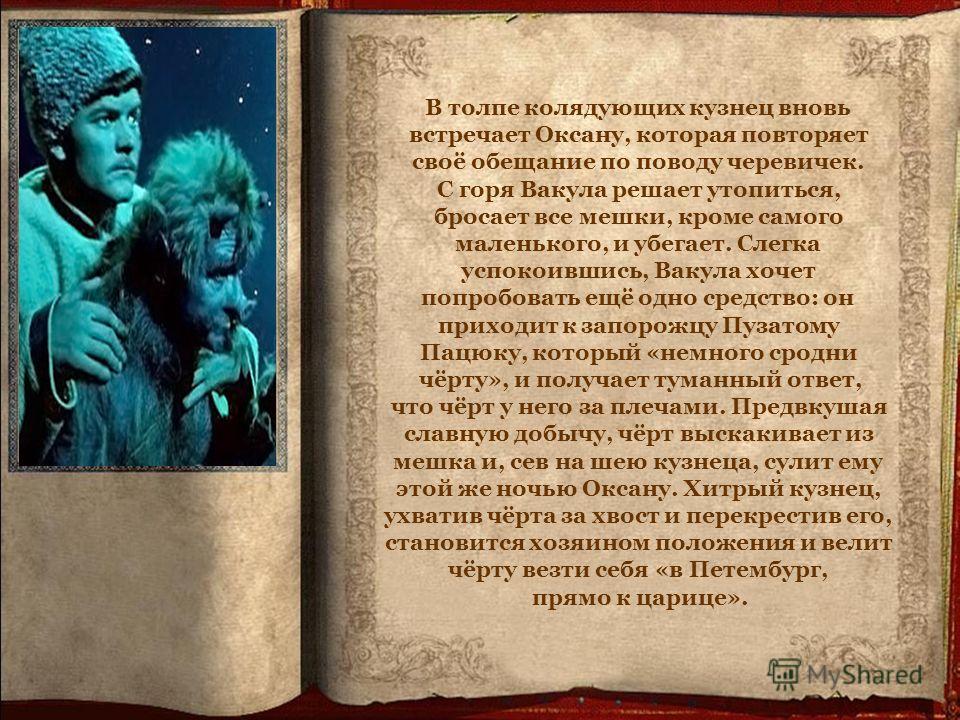
Once in St. Petersburg, the blacksmith comes to the Cossacks, whom he met in the fall, when they passed through Dikanka. With the help of the devil, he achieves that he was taken to an appointment with the queen. Marveling at the luxury of the palace and the wonderful painting, the blacksmith finds himself in front of the queen and asks her for royal shoes. Touched by such innocence, Ekaterina draws the attention of Fonvizin, who is standing at a distance, to this passage, and Vakula gives slippers. In the village at this time, the Dikan women are arguing about exactly how Vakula laid hands on himself.
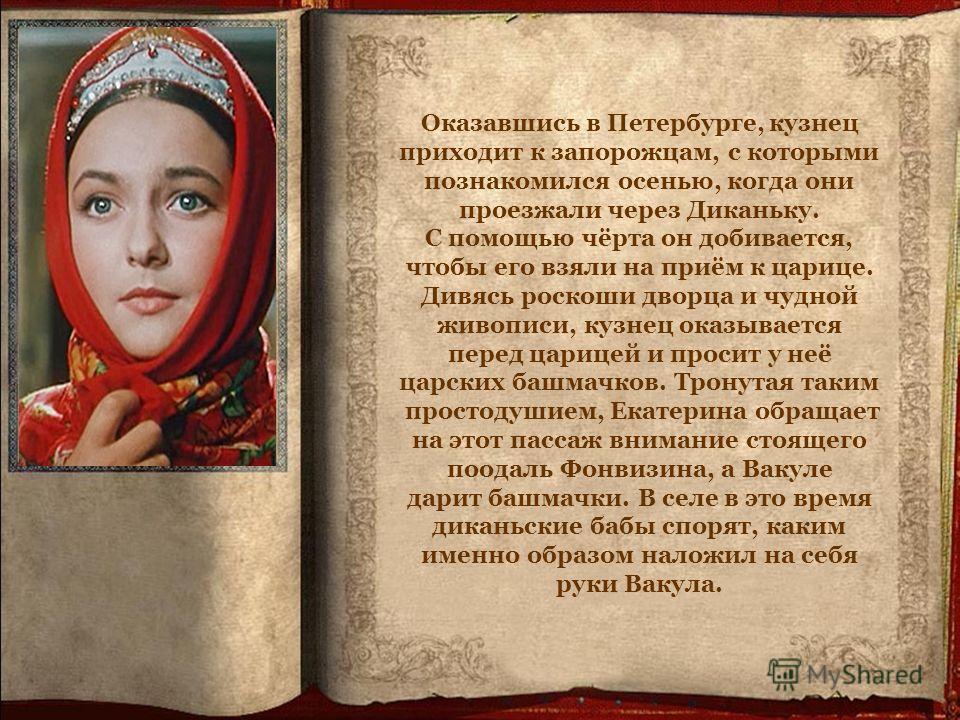
These gossip embarrass Oksana, she cannot sleep all night, and by morning she “fell head over heels in love with a blacksmith.” The returning blacksmith takes out a new hat and belt from the chest and goes to Chub with a request to give Oksana for him. Chub, seduced by gifts and annoyed by Solokha's treachery, agrees. He is echoed by Oksana, who is ready to marry a blacksmith "and without slippers." Having got a family, Vakula painted his hut with paints, and in the church he painted a devil, but “so nasty that everyone spat when they passed by.”
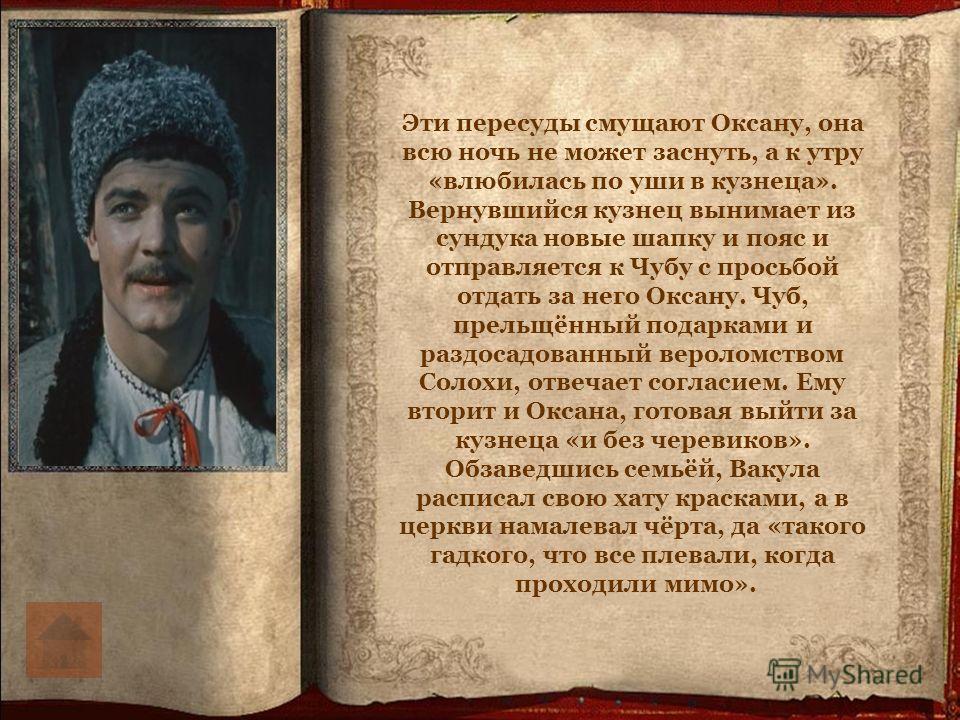
Analysis of the work This story opened the second part of Evenings on a Farm near Dikanka, which was published in 1832. However, The Night Before Christmas was written in its original version much earlier, most likely as early as 1830. Compared with the draft edition, preserved in Gogol's handwritten notebook, the changes were mainly made to the second part of the story, the description of Vakula's arrival in Petersburg, and especially the scene of the complaint of the Cossacks.
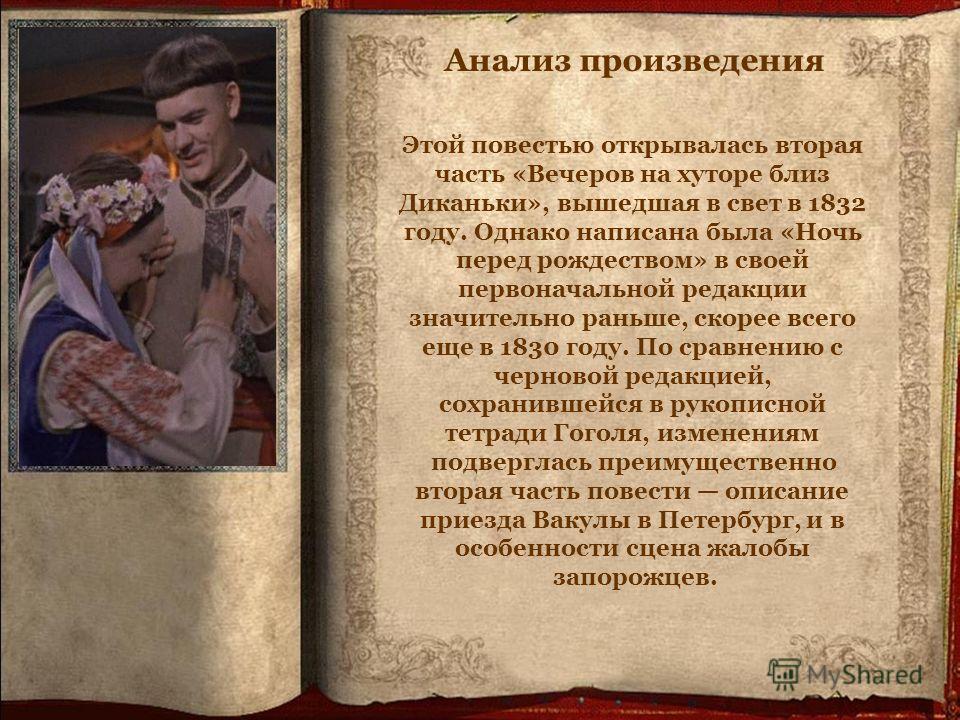
In addition, censored notes were made in the story, which are now being restored from a draft manuscript. So, undoubtedly for censorship reasons, the jokes of Vakula, the baptizing devil, and the words of a Cossack protesting against harassment were not placed: “Have mercy, mom! why are you destroying the faithful people? what did you get angry about?" In The Night Before Christmas, Gogol also makes extensive use of folklore. The image of the devil stealing the moon, the story of his miraculous flight with Vakula go back to folklore sources. In the "Book of all sorts of things" there is such an entry by Gogol: "There is a belief that witches remove and hide the stars."
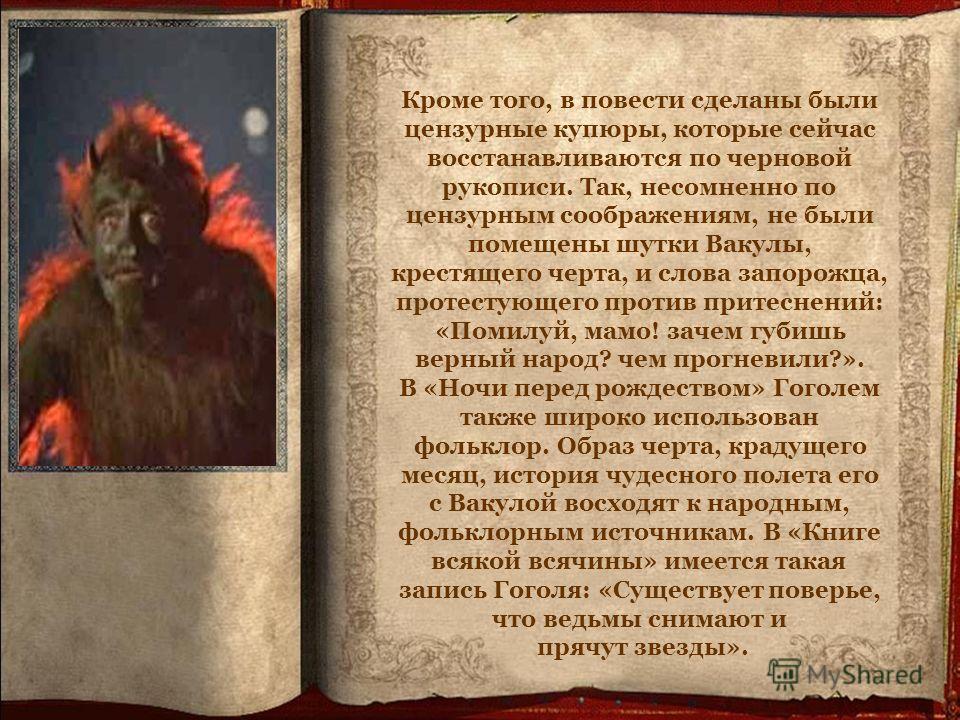
Known in folklore and the image of how the devil flies through the chimney to the witch on a date. The image of the devil in "The Night Before Christmas" is also close to the comic figure of the demon in the "den" drama. The action of the story refers to the second half of the 18th century, as can be seen from the description of the trip of the blacksmith Vakula to St. Petersburg, to the palace of Catherine II. The meeting of the Zaporizhzhya deputies with Catherine, who sought to involve the Zaporozhians in the fight against the Turks and Tatars, the complaints of the Zaporozhians about the oppression by the government reflect real historical events. The tsarist government, willingly accepting the help of the Cossacks, at the same time tried in every possible way to limit the "liberties" of the Sich and completely subordinate it to its influence.
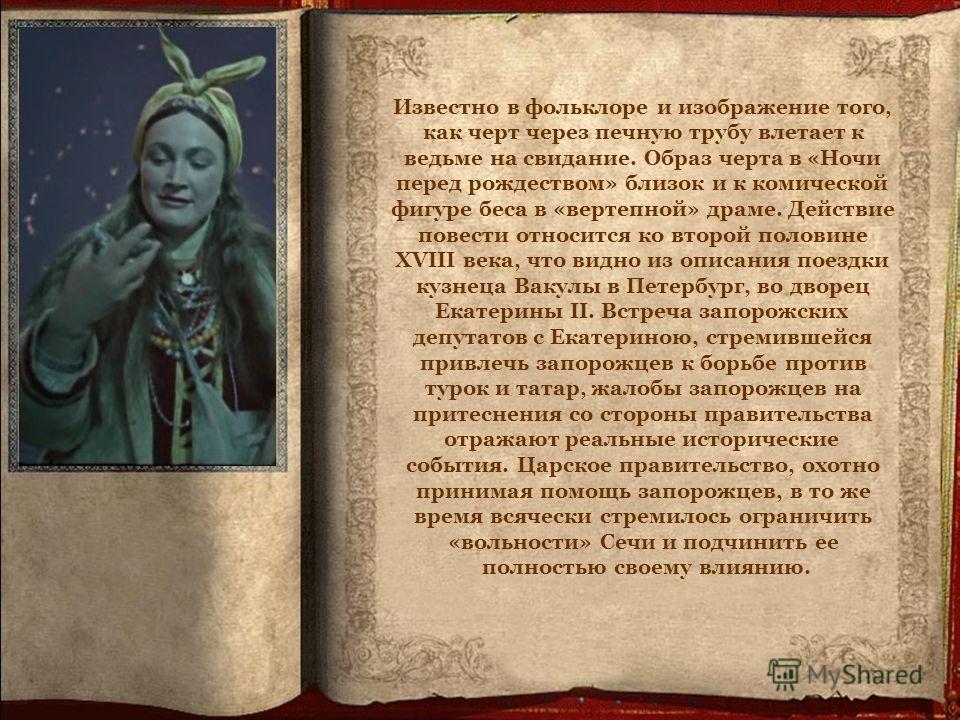
The “misfortunes” that the Cossacks complain about are the construction of government fortresses around the Sich, projects to liquidate the Zaporozhian army and thereby “turn” the Cossacks into “Carabinieri”, that is, into regular troops. Protesting against the oppression of the Cossacks, the deputies pointed to their loyalty to the state interests of Russia, referring to the participation of the Cossacks in the liberation wars with the Turks and Crimean Tatars. Among the people surrounding Catherine, Gogol portrays D. Fonvizin, the author of the comedies Brigadier and Undergrowth.
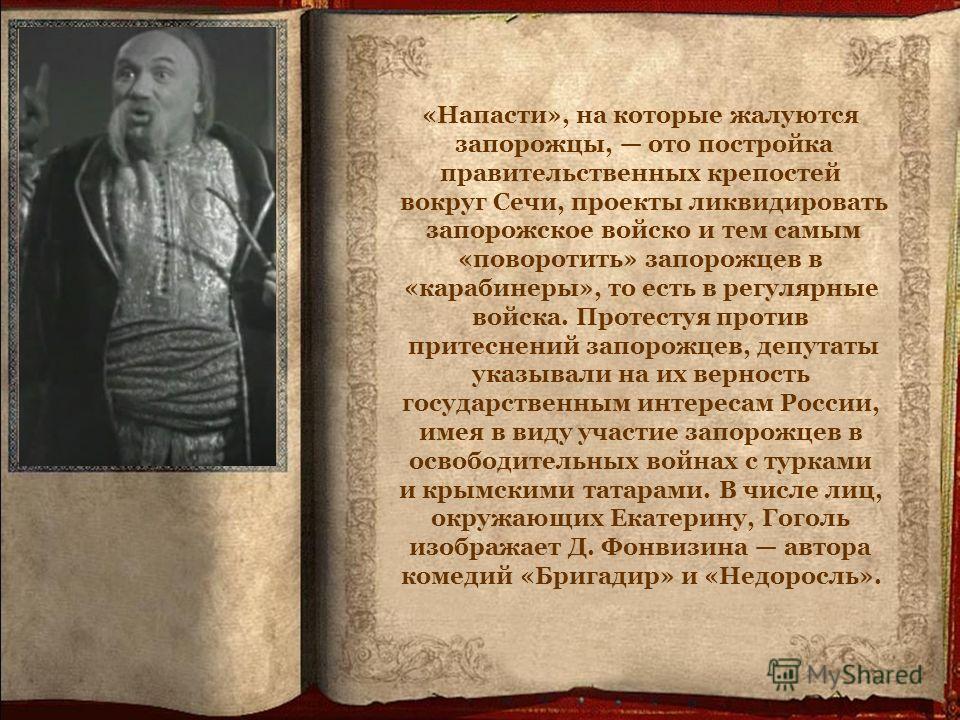
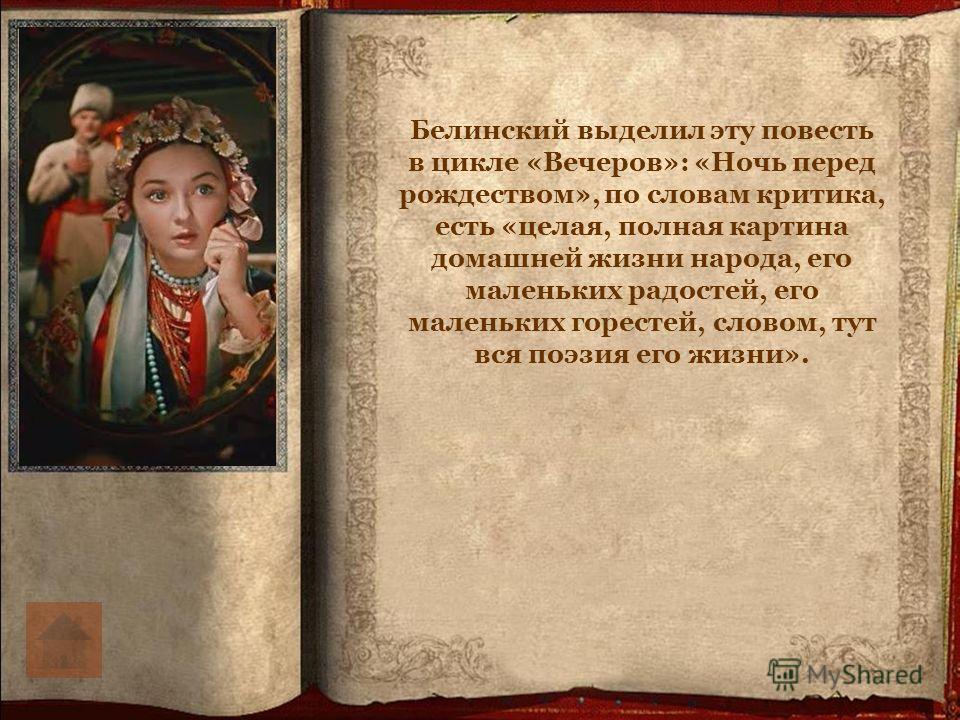
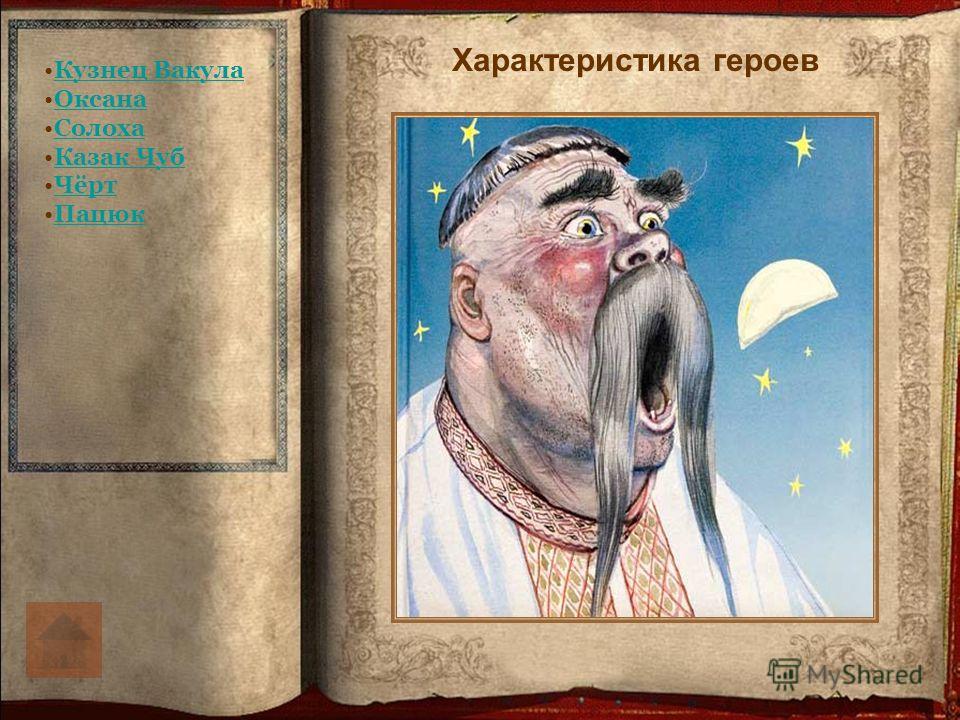
Blacksmith Vakula is cheerful and responsible, gentle and strong, economic and easy-going guy. He helps his mother run the household, enjoys well-deserved respect in the village, but you cannot call him a completely happy person, because Vakula loves the proud and wayward beauty Oksana. For her sake, even the devil himself is not an enemy to a blacksmith. Grabbing the unclean by the tail and chasing with holy words, crosses and prayers, Vakula rushes to St. Petersburg, to the queen, for a gift for his capricious beloved. With his modesty and simplicity, he charms the queen to such an extent that, at the request of the blacksmith, she gives him her favorite little laces. So, thanks to the determination, resourcefulness, and strength of her love, Vakula completes the task, which at first seems to be a completely impossible whim of a frivolous girl. Vakula's perseverance and perseverance, his many virtues, his love and loyalty still did not leave the beautiful Oksana indifferent. She regrets that she was so unkind and harsh in relations with him, and realizes that she is also in love. Blacksmith Vakula
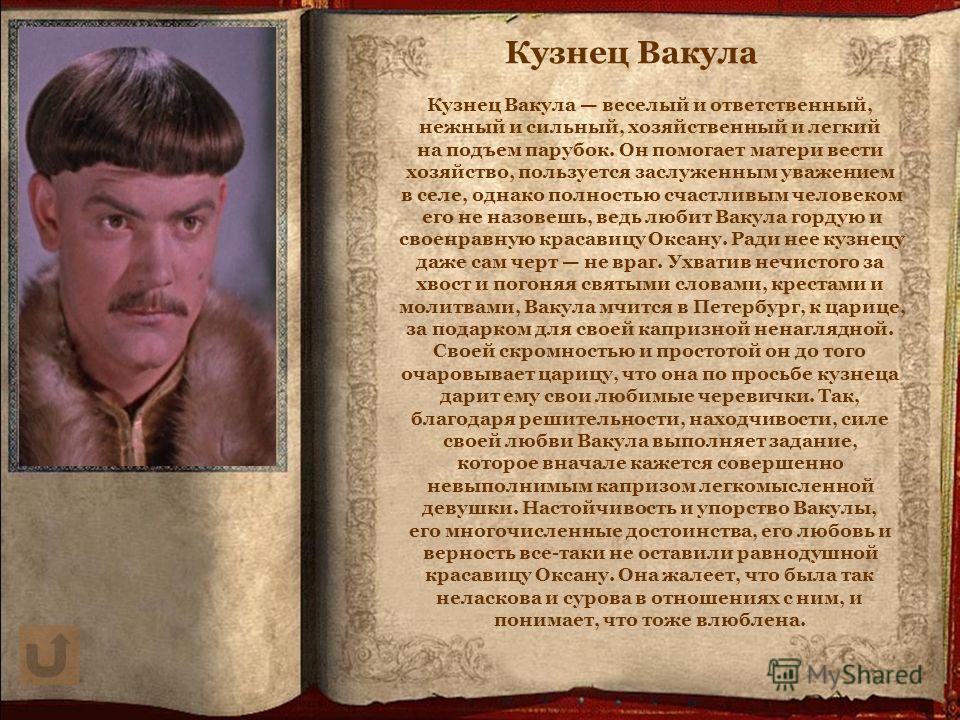
Oksana Oksana - proud and arrogant, at first she did not want to pay attention to how affectionately Vakula spoke to her and with what love he looked at her. The girl set a condition: if the blacksmith Vakula brought her the little laces worn by the queen, then she would marry him the same hour. And Vakula, hearing this, decided that the capricious beauty did not love him at all, but only laughed at him. “Well, God sleep! he decided. - As if there is only one Oksana in the whole world. Thank God, there are many good girls even without her in the village. What about Oksana? she will never be a good mistress; she is only a master of dressing up ... ”But the image of Oksana, her cheerful laugh did not leave the blacksmith. When news reached Oksana that the blacksmith had drowned, she was embarrassed, she believed and did not believe, she could not sleep all night ... "and by morning she fell head over heels in love with the blacksmith." Still, she was an ordinary, sensitive, well-bred Ukrainian girl who saw herself in the future as the wife of a loving husband and a good housewife. The next morning in the church, “Oksana stood as if not herself ... So many different feelings crowded into her heart, one more annoying than the other, one sadder than the other, that her face expressed only strong embarrassment, tears trembled in her eyes ah ...” When the blacksmith returned and approached to her, “took her by the hand: the beauty lowered her eyes. She has never been so wonderfully beautiful. The delighted blacksmith kissed her softly, and her face lit up more, and she became even better.
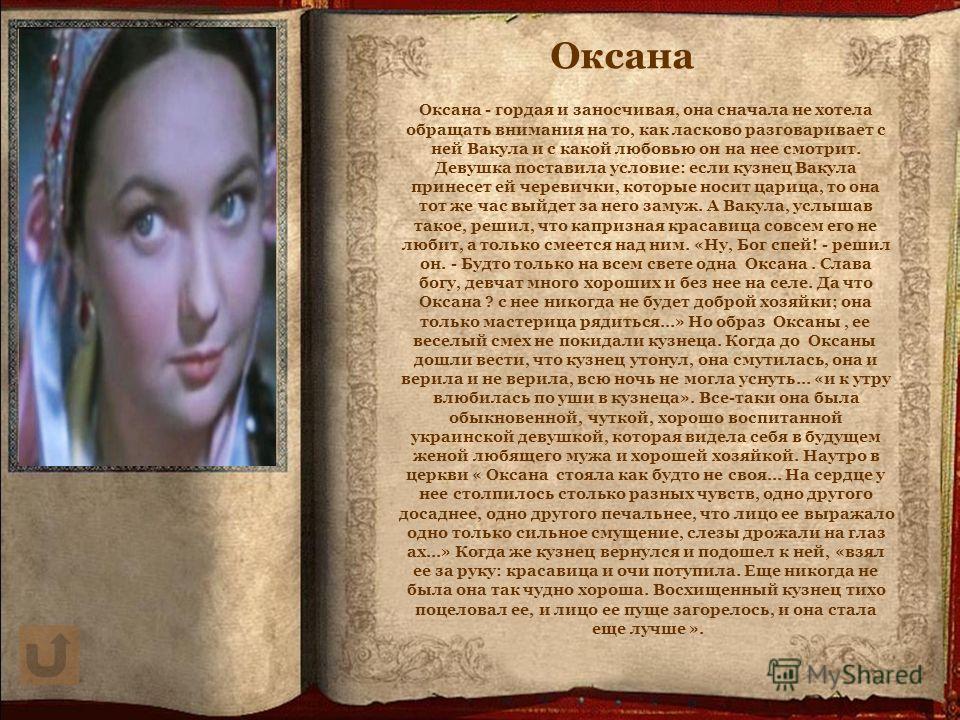
Solokha is a prudent and cunning woman, deftly managing her many admirers. Solokha “was so able to charm the most sedate Cossacks to herself that the head, and the clerk Osip Nikiforovich, and Chub, and Kazak Kasyan went to the pen. And, to be honest, she knew how to skillfully deal with them. It never occurred to any of them that he had a rival ... Maybe these very cunning and sharpness of hers were the fault that in some places the old women began to say, especially when they drank too much somewhere at a merry gathering, which Solokha definitely witch". Solokha
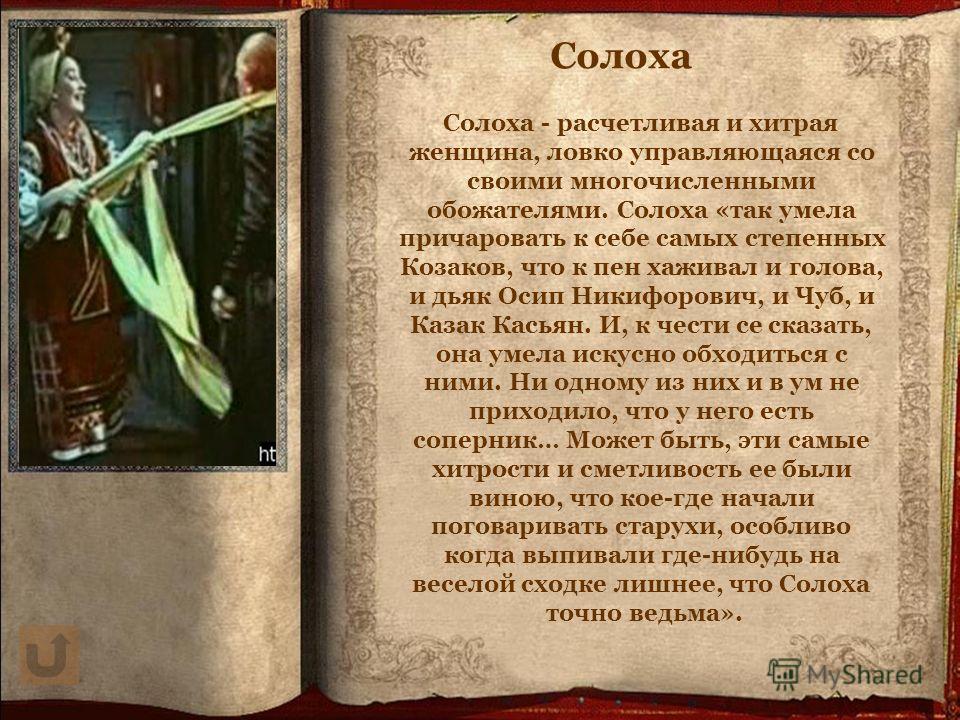
Cossack Chub The image of the old ladies' man Cossack Chub, a narrow-minded, slow-thinking man, and at the same time stubborn, self-confident, is fanned with wonderful humor. The image of a deacon, busy looking for earthly pleasures, acting as one of the "solid" competitors in the line of Solokha's admirers, is also very expressive.
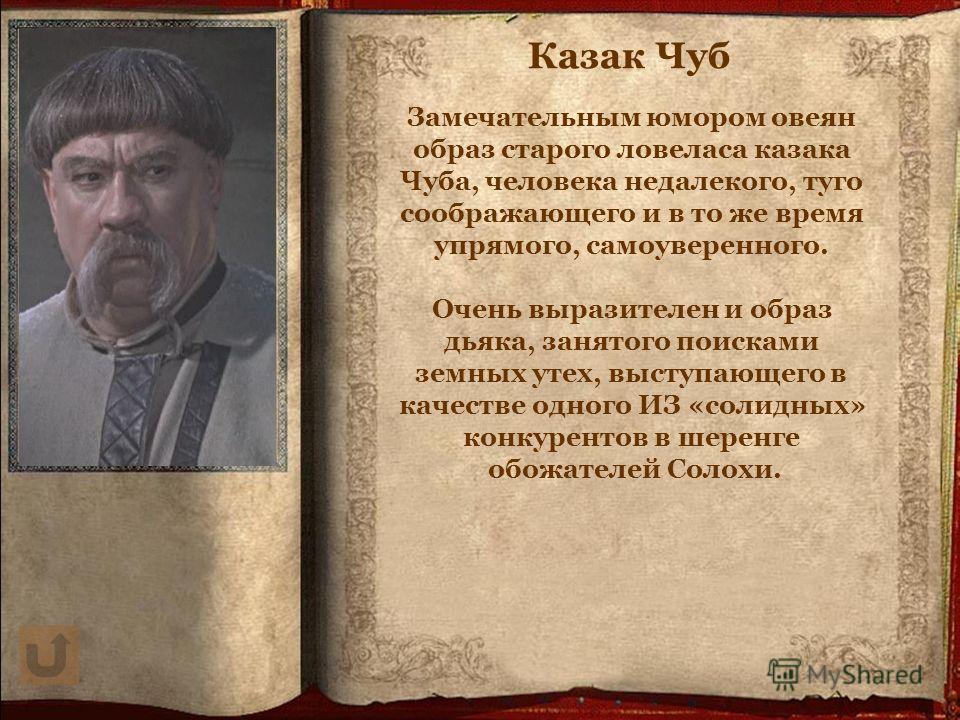
The devil The devil is an evil spirit in Slavic mythology. This creature is covered with black hair, with horns, tails and hooves. He is able to turn into a black cat, dog, pig. More often - in a person, a wanderer, a blacksmith, a baby. It can take on the appearance of a friend: a neighbor, a husband, etc. In popular beliefs, the devil constantly interferes in people's lives, causes minor troubles, coerces into unjustified acts, makes drunks stray, provokes crimes, suicide, trying to get a person's soul. The devil is shown by Gogol as a cunning prankster. "Meanwhile, the devil crept slowly towards the moon and already stretched out, there was a hand to grab it, but suddenly pulled it back ... ran further." The last night remained for the devil to wander around the world and learn the sins of good people. He was very glad that he could take revenge on the blacksmith. "Now the blacksmith is caught!" - he thought to himself, now I will take out on you, my dear, all your drawings and fables, tormented by devils! ... in my hands. "But Nothing worked out for this prankster. "And so, instead of tricking, seducing and fooling others, the enemy of the human race was himself fooled."
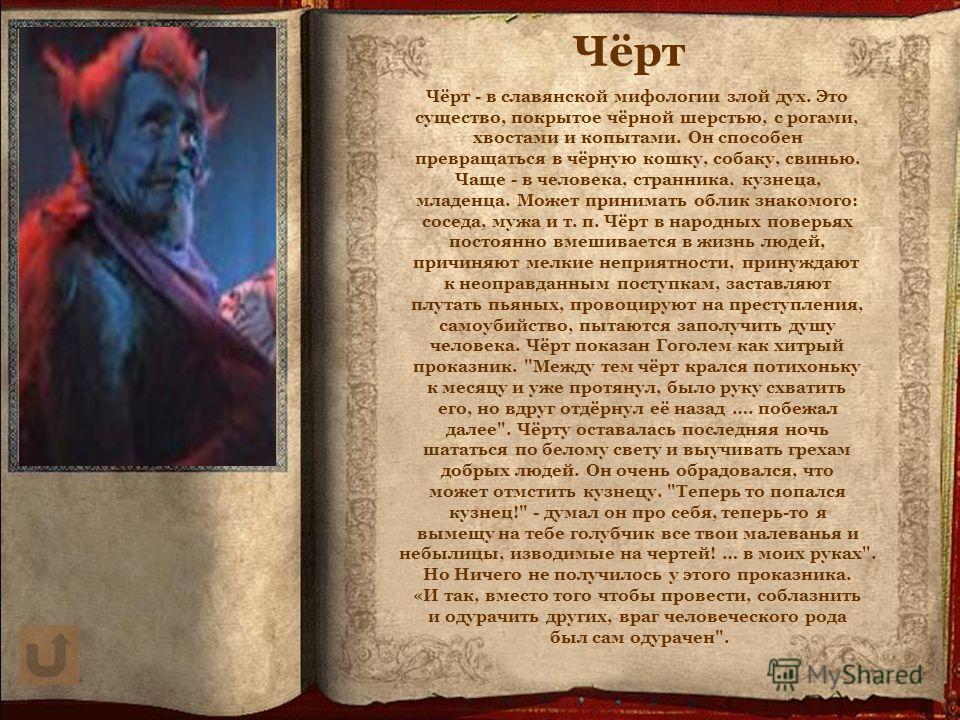
Patsyuk Patsyuk is an episodic character. His past is vague: he was once a Cossack; but they expelled him or he himself fled from Zaporozhye, no one knew this. He is striking in his appearance: small in stature, very weighty, in the widest trousers, Patsyuk, when moving along the street, does not look like a person, but like a distillery. Perhaps someone who is well acquainted with Russian epics will remember the image of Pogany Idolishch: the opponent of Ilya Muromets was two fathoms printed in the valley, and a fathom was printed wide, and the head that after all is a fierce sucker, and the eyes are like beer bowls, and the nose is from on his face he was with an elbow. In both cases, both in a literary work and in an epic, when describing the appearance of the characters, the technique of hyperbole is used. However, comparing the two descriptions, we can conclude that if the Poganoe Idolishche is drawn by an unknown epic narrator with the blackest colors and makes a repulsive impression, then Gogol's Patsyuk does not have such an effect on the reader. In the description of the latter’s appearance, one can feel rather the writer’s condescending grin, especially when the author says that lately the Cossack has rarely appeared anywhere, because it became more and more difficult for him to crawl through the door every year. Moreover, Gogol notes that the inhabitants of Dikanka often turned to Patsyuk for help, because already a few days after the arrival of the former Cossack in the village, everyone ... found out that he was a healer.
